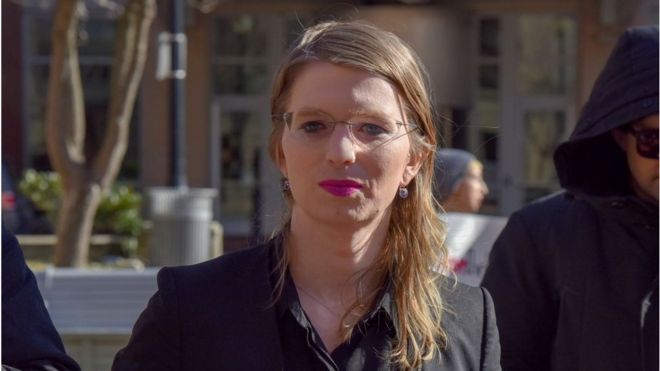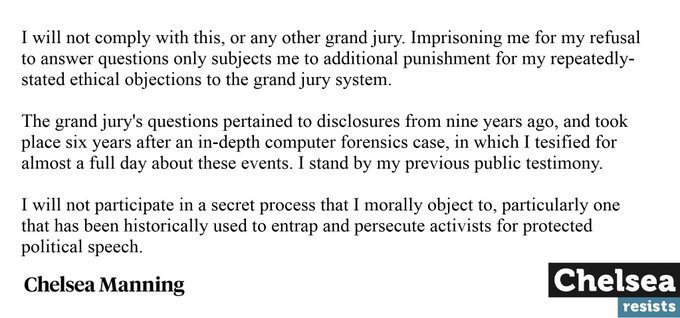https://www.democracynow.org/2019/3/11/glenn_greenwald_chelsea_mannings_refusal_to?autostart=true
Two very good interviews: Glenn Greenwald and Daniel Ellsberg on Democracy Now.
RECOMMEND: Go to the link – – the video is at top.
TEXT FOR BACK-UP:
Chelsea Manning has been sent back to jail after refusing to answer questions before a grand jury investigating WikiLeaks and its founder Julian Assange. Manning, a U.S. Army whistleblower, had been subpoenaed by federal prosecutors in Virginia’s Eastern District to appear for questioning about her 2010 leak to WikiLeaks of hundreds of thousands of State Department and Pentagon documents about the U.S. wars in Iraq and Afghanistan. We speak with Glenn Greenwald, Pulitzer Prize-winning journalist and one of the founding editors of The Intercept.
Transcript
- GREENWALD
AMY GOODMAN: Music by Mangueira, Brazil’s most famous samba school. Last week, Mangueira won Carnival in Rio de Janeiro, getting a perfect score from judges for its float honoring Rio Councilwoman Marielle Franco, who was assassinated almost a year ago. This is Democracy Now!, democracynow.org, The War and Peace Report. I’m Amy Goodman.
U.S. Army whistleblower Chelsea Manning has been sent back to jail after refusing to answer questions before a grand jury investigating WikiLeaks and its founder, Julian Assange. Manning had been subpoenaed by federal prosecutors in Virginia’s Eastern District to appear for questioning about her 2010 leak to WikiLeaks of hundreds of thousands of State Department and Pentagon documents about the U.S. wars in Iraq and Afghanistan.
To talk more about the jailing of Manning, as well as other issues, including what’s happening in Venezuela, we turn right now to Glenn Greenwald, speaking to us from Brazil. He’s a Pulitzer Prize-winning journalist, one of the founding editors of The Intercept.
Glenn, welcome back to Democracy Now! Talk about Chelsea Manning once again being jailed.
GLENN GREENWALD: I don’t think it’s a surprise to anybody that Chelsea Manning is extraordinarily heroic. She has demonstrated that repeatedly over the last decade in all kinds of ways. But what she’s doing here is really remarkable, because the context is that the Trump administration is trying to do what the Obama administration tried to do but ultimately concluded it couldn’t do without jeopardizing press freedoms, which is to prosecute WikiLeaks and Julian Assange for what it regards as the crime of publishing top-secret or classified documents.
And the media in the United States has spent two years screaming about the threat that Trump poses to press freedoms because he says mean things about the media on Twitter or insults Wolf Blitzer and Chuck Todd, and yet here we have what is really a grave threat to press freedom: the attempt to make it a felony to publish classified material—which is what WikiLeaks did. Even the anti-press freedom Obama administration said this was a bridge too far for us.
And while most reporters are mute on this scandal, on this controversy, and while a lot of Democrats are supportive of it, because they still hate WikiLeaks so much from the 2016 election that they’re happy to see Julian Assange go to jail, even if it means standing behind the Trump administration, Chelsea Manning is not just opposing it, she’s opposing it to the point where she refuses to participate in it, even if it means, as it now does, that she’s going to be jailed for being in contempt of court for refusing to comply with a subpoena. We all owe our immense gratitude to Chelsea Manning for everything she’s done over the last decade, but even more so now.
AMY GOODMAN: I’d like to go back to 2017, when Mike Pompeo talked about Chelsea Manning in his first address as CIA director in April of last year [sic].
MIKE POMPEO: WikiLeaks walks like a hostile intelligence service and talks like a hostile intelligence service and has encouraged its followers to find jobs at the CIA in order to obtain intelligence. It directed Chelsea Manning in her theft of specific secret information. It overwhelmingly focuses on the United States, while seeking support from anti-democratic countries and organizations. It’s time to call out WikiLeaks for what it really is: a nonstate, hostile intelligence service, often abetted by state actors like Russia.
AMY GOODMAN: So, that was Pompeo when he was head of the CIA. Now, of course, he is secretary of state. Can you respond to what he has said, Glenn Greenwald?
GLENN GREENWALD: This is the part I find so amazing. Do Democrats not realize the irony here of cheering for the most reactionary, right-wing forces in the Trump administration, who are the ones trying to imprison Julian Assange and WikiLeaks in order to criminalize journalism—namely, Mike Pompeo—and the person who actually first vowed to put WikiLeaks and Assange behind bars, which was then-Attorney General Jeff Sessions, who has since left the Trump administration?
The Obama administration tried to create theories to say that WikiLeaks did more than just passively receive documents from Chelsea Manning and then publish them, because they knew they had to do that in order to prosecute WikiLeaks; otherwise, how do you justify prosecuting WikiLeaks for publishing classified documents, without also prosecuting The New York Times and The Guardian? The Justice Department, under Obama, searched high and low for evidence that WikiLeaks participated in Chelsea Manning’s taking of those documents. They found no evidence. She testified under oath that she acted alone, that they played no role whatsoever in her decision to do that.
And now, suddenly, seven years later, Mike Pompeo claims that they have evidence or that they believe that WikiLeaks told her to do it, and therefore they intend to prosecute WikiLeaks. And unfortunately, between the Republicans, who have long hated WikiLeaks for exposing the war crimes of the Bush administration, and Democrats, who now hate WikiLeaks because they published documents that were harmful to or reflected poorly on Hillary Clinton and the Democratic Party, very few people are willing to stand up to this very serious attack on press freedom. And thankfully, Chelsea Manning is one of those people.
AMY GOODMAN: I want to turn to John Bolton speaking about Chelsea Manning in the 2012 BBC film Wikileaks: The Secret Life of a Superpower. He was interviewed by Richard Bilton.
RICHARD BILTON: What do you think of Bradley Manning?
JOHN BOLTON: I think he committed treason. I think he should be prosecuted to the fullest extent of the law.
RICHARD BILTON: What does that mean?
JOHN BOLTON: Well, treason is the only crime defined by our Constitution, and it says treason shall consist only of levying war against the United States or adhering to their enemies, giving them aid and comfort. And he gave our enemies a lot of aid and comfort.
RICHARD BILTON: So what should happen to him?
JOHN BOLTON: Well, he should be prosecuted. And if he’s found guilty, he should be punished to the fullest extent possible.
RICHARD BILTON: And what is that?
JOHN BOLTON: Death.
RICHARD BILTON: You think he should be killed.
JOHN BOLTON: Yes.
AMY GOODMAN: “You think you should be killed.” “Yes,” responded John Bolton, now the national security adviser. Of course, Bradley Manning became Chelsea Manning. She announced her transition the day she was sentenced. Glenn Greenwald?
GLENN GREENWALD: These are the sentiments that are driving the current attempt to prosecute WikiLeaks and Assange. And those are the monsters who are responsible for it.
So, I would hope that however angry someone might be at Julian Assange or WikiLeaks for whatever they think they did as part of the 2016 election to undermine Hillary Clinton by publishing truthful documents that showed the corruption of the DNC, however angry one might be at WikiLeaks for having done that, one can separate those emotions and understand that what the Trump administration has nothing to do with the 2016 election. The criminal proceedings that have led to Chelsea Manning’s jailing for the second time in the last decade are all about documents that were published, not in 2016, but in 2011 and 2012.
And it’s being done by people, like John Bolton, who believe that if you publish top-secret documents that report on the misdeeds and criminal acts of the U.S. government, you’re not only a criminal, but a traitor who deserves to be killed. You just heard that with your own ears. And so, anyone supporting the Trump administration’s efforts to put Julian Assange in prison because you’re angry about what he did in the 2016 election, you’re aligning yourself with and you’re empowering those warped, sociopathic sentiments that you just heard come out of John Bolton’s mouth.
2. “I Know No One More Patriotic”: Daniel Ellsberg Praises Chelsea Manning After She Is Jailed Again
RECOMMEND: Watch the video:
https://www.democracynow.org/2019/3/11/i_know_no_one_more_patriotic
AMY GOODMAN: U.S. Army whistleblower Chelsea Manning has been sent back to jail after refusing to answer questions before a grand jury investigating WikiLeaks and its founder, Julian Assange. Manning had been subpoenaed by federal prosecutors in Virginia’s Eastern District to appear for questioning about her 2010 leak to WikiLeaks of hundreds of thousands of State Department and Pentagon documents about the U.S. wars in Iraq and Afghanistan. Manning was in prison from 2010 to 2017 for the leak. President Obama commuted her sentence before he left office. Chelsea Manning briefly spoke to reporters on Friday on her way into court.
CHELSEA MANNING: So, this is a contempt hearing. It’s a sealed hearing. The public isn’t allowed. The proceedings are going to happen in secret. The filings are sealed. So, can’t really talk about the specifics of what’s going on, beyond what we explained in the statement. But, you know, I’m pretty confident that we have a basis and a grounds on which to oppose this.
REPORTER: And you said in your statement you’re prepared to go to jail for this?
CHELSEA MANNING: If it comes to that, yeah. If it comes to that, you know, it comes to that. If it comest to going—you know, I might not leave here today, you know, free, so…
AMY GOODMAN: In a written statement, Chelsea Manning later said, quote, “I will not comply with this, or any other grand jury. Imprisoning me for my refusal to answer questions only subjects me to additional punishment for my repeatedly-stated ethical objections to the grand jury system.
“The grand jury’s questions pertained to disclosures from nine years ago, and took place six years after an in-depth computer forensics case, in which I testified for almost a full day about these events. I stand by my previous public testimony,” she wrote.
Well, on Sunday, Democracy Now! spoke with Pentagon Papers whistleblower Daniel Ellsberg at his home in California.
DANIEL ELLSBERG: This is a continuation of seven-and-a-half years of torture of Chelsea Manning, in an effort to get her to contribute to incriminating WikiLeaks, so that they can bring Julian Assange or WikiLeaks to trial on charges that would not apply to The New York Times. It’s been speculated for years now that the secret charges, if they did exist—and apparently they do exist—against Julian Assange were under the same charges that I was first—the first person to be prosecuted for, back in 1971: violations of the Espionage Act, conspiracy and theft. It would be the same cases brought against me.
Unfortunately, bringing that against a journalist is even more blatantly a violation of the First Amendment, freedom of the press. And although Donald Trump has made it very plain he would love to prosecute and convict The New York Times, he doesn’t have the guts to do that, to do what he wants, fortunately, because it would be so obviously unconstitutional, that although his base would be happy with it and he would be happy with it, he would get into too much trouble constitutionally. So he wants to find charges against Julian that would be different from mine, because if he brought the same charges that he brought against me—in this case, against a journalist—it would clearly be found unconstitutional.
And so, Chelsea, having failed to give them what they wanted over seven-and-a-half years here she was incarcerated, or since, or in the grand jury—namely, false incriminating charges against WikiLeaks—they’re resorting again to torture, which does work at getting false confessions. That’s what it’s for. That’s what it mainly does. They want her to contradict her earlier sworn testimony many times, that she behaved in relation to WikiLeaks exactly as she would have to The New York Times or The Washington Post, to whom she went first, before going to WikiLeaks. And they didn’t pick up on what she was offering, so she went to WikiLeaks. But she took sole responsibility, not to spare them, but because that was the truth. And she tells the truth.
She’s a very patriotic person. I know no one more patriotic, actually, willing to risk and even give her own freedom, her own life, in order to preserve our constitutional freedoms and the Constitution. I admired her then. I admire her now. And right now she’s refusing to take part in basically a conspiracy against press freedom in this country, led by the president of the United States and the secretary of state.
AMY GOODMAN: Pentagon Papers whistleblower Daniel Ellsberg, speaking on Sunday to Democracy Now! Ellsberg went on to talk about the historical significance of Chelsea Manning’s actions.
DANIEL ELLSBERG: We know the questions that were asked Chelsea in the day that she spent in the grand jury, and also were asked another witness, who did testify, David House. In both cases, they were asked only about their relations with WikiLeaks in 2010, nine years ago, long before the very controversial, and properly controversial, actions of WikiLeaks in the last year or two.
This was when WikiLeaks was putting out what Chelsea gave them, the video of “Collateral Murder,” which I urge people to look at. Now, I’m sure very few have seen that in the last nine years. What they are witnessing is a very typical, by all reporting, act of murder. And I say that as a former Marine operations officer who taught the laws of wars to battalion, 3rd Battalion, 2nd Marines, at Camp Lejeune. And I would hope that anyone that I taught would recognize in that film that what they’re watching is a war crime, is murder. Not all killing in war is murder, but some of it is. And she revealed it.
U.S. SOLDIER 1: Clear. Clear.
U.S. SOLDIER 2: We’re engaging.
U.S. SOLDIER 1: Should have a van in the middle of the road with about 12 to 15 bodies.
U.S. SOLDIER 2: Oh, yeah, look at that. Right through the windshield! Ha ha!
DANIEL ELLSBERG: She also revealed massive, widespread torture being conducted by our Iraqi allies, with our knowledge and complicity, going on into President Obama’s term, from George W. Bush. So there’s a lot of resentment against her in the intelligence community and in the Army, in general, about the shameful things that she revealed. Also assassination squads, death squads, and corruption, in general, that we condoned in our allies, among dictators, like Ben Ali of Tunisia, who was forced out by nonviolent protest on the basis of Chelsea Manning’s revelations through Le Monde.
AMY GOODMAN: Daniel Ellsberg, speaking Sunday to Democracy Now! about Chelsea Manning. Ellsberg himself faced life imprisonment after leaking the Pentagon Papers about the Vietnam War. He was a high-level Pentagon official who obtained the papers while working at the RAND Corporation.
When we come back, we’ll speak to Pulitzer Prize-winning journalist Glenn Greenwald of The Intercept. This is Democracy Now! Back in a minute.
Next story from this daily show
Greenwald: White House Spread False Story About Venezuela Burning Aid Trucks to Win Support for War








